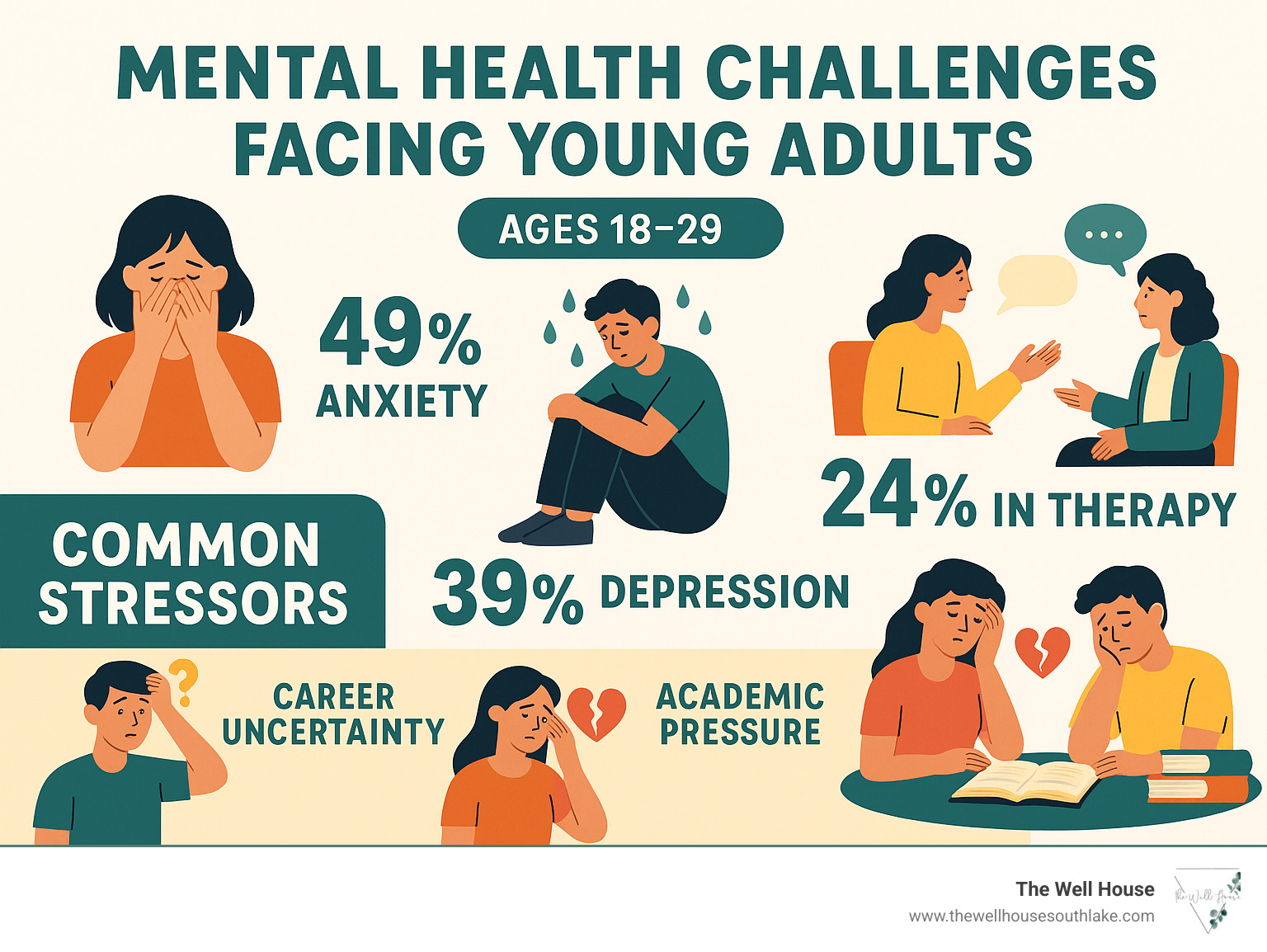Therapy Near Me: Guiding Young Adults to Mental Wellness
Why Young Adults Are Turning to Therapy More Than Ever
Finding therapists for young adults near me is a growing priority as this generation steers a unique set of modern challenges. With mental health concerns like depression and anxiety on the rise for this age group, professional support has become more critical than ever.
Quick ways to find therapists for young adults in your area:
- Use online therapist directories with age specialty filters
- Contact your insurance provider for in-network professionals
- Ask your primary care doctor for referrals
- Check university counseling centers if you’re a student
- Use telehealth platforms for more options
Young adulthood, from ages 18 to 29, is a perfect storm of stressors. Career uncertainty, relationship challenges, financial pressure, and the task of “figuring out life” can leave many feeling lost and anxious. This is often when people first experience significant mental health challenges.
The good news? Seeking therapy as a young adult isn’t just normal – it’s smart. Starting therapy early helps build coping skills, improves self-awareness, and creates a foundation for lifelong mental wellness.
At The Well House, our counselors specialize in helping young adults steer these transitions. Our soul-mind-body approach helps clients explore their emotional, physical, and spiritual alignment during this crucial life stage.

Learn more about therapists for young adults near me:
Understanding the Need: Why Young Adults Seek Therapy
Common Mental Health Challenges
Young adults frequently grapple with serious conditions that benefit from professional support.
- Anxiety: Pervasive worry and panic attacks are common as young adults question if they are on the right path.
- Depression: Feelings of persistent sadness and hopelessness are on a concerning upward trend for this generation.
- Relationship issues: Navigating new friendships, romantic partners, and changing family dynamics can be incredibly stressful.
- Career uncertainty & academic pressure: The pressure to succeed can lead to stress, indecision, and feeling “left behind.”
- Identity exploration: Answering “Who am I?” is a fundamental task of this life stage that can bring turmoil and confusion.
- Family conflict: Seeking independence can strain family dynamics, leading to conflict and misunderstanding.
According to the National Institute of Mental Health (NIMH), nearly one in five U.S. adults lives with a mental illness, highlighting that these challenges are widespread.
Signs It’s Time to Find a Therapist
If you’re wondering whether to seek therapy, it’s probably a good time to explore it. Here are some clear signs it’s time to find a therapist:
- Persistent sadness or irritability that interferes with daily life.
- Overwhelming worry or frequent panic attacks.
- Withdrawing from friends, family, or activities you once enjoyed.
- Significant changes in sleep or appetite.
- Struggling to focus on school or work.
- Feeling stuck, hopeless, or that nothing will get better.
- Increased use of substances or technology as coping mechanisms.
You don’t have to be diagnosed with a mental health issue to benefit from therapy; it’s also for navigating everyday life challenges and personal growth.
The Benefits of Starting Therapy Young
Starting therapy in young adulthood is an empowering investment in your future self.
- Developing coping skills: Learn practical tools to manage stress and difficult emotions in healthy ways.
- Building self-esteem: Cultivate self-awareness and self-compassion to build confidence.
- Gaining clarity on life goals: Get a space to explore your true desires, separate from external pressures.
- Improving communication: Learn to voice your needs, set boundaries, and engage in healthier relationships.
- Healthier relationships: Foster more fulfilling connections with friends, family, and partners.
- Creating a foundation for lifelong wellness: Build resilience and a strong mental health foundation that will serve you for life.
Investing in counseling now can help you design the mindset you want. For more insights, check out our guide on Stress Management for Young Adults.
Exploring Your Options: Types of Therapy for Young Adults
Finding the right therapist is a personal journey. The world of therapy offers many different approaches, and the key is to find what works for you. Some people prefer structured, goal-oriented methods, while others thrive by exploring deeper emotional patterns.
Common Therapeutic Approaches
When you’re searching for therapists for young adults near me, you’ll encounter several approaches. Each has its own strengths.
- Cognitive Behavioral Therapy (CBT): A well-known approach that helps you identify and change negative thinking patterns. It’s highly effective for anxiety and depression.
- Dialectical Behavior Therapy (DBT): Focuses on emotional regulation, mindfulness, and distress tolerance, helping you manage intense emotions.
- Psychodynamic Therapy: Explores how past experiences and unconscious patterns influence your current behaviors and relationships.
- Eye Movement Desensitization & Reprocessing (EMDR): A powerful, evidence-based approach for processing traumatic memories, often more effective than traditional talk therapy for trauma.
- Humanistic Therapy: A client-centered approach that emphasizes your inner capacity for growth, focusing on authenticity and self-actualization.
- Somatic Therapy: Recognizes that emotions are stored in the body and uses physical awareness to help process distress and trauma.
Comparing Common Therapy Types
| Therapy Type | Focus | Best For |
|---|---|---|
| CBT | Changing negative thought patterns and behaviors | Anxiety, Depression, Phobias |
| DBT | Emotional regulation, mindfulness, distress tolerance | Emotional regulation, Self-harm, Trauma |
| Psychodynamic | Exploring unconscious feelings and past experiences | Deep-seated issues, Relationship patterns |
Individual, Group, and Online Therapy Formats
Beyond the approach, you’ll also decide on a format that fits your lifestyle.
- Individual counseling: The traditional one-on-one format, offering personalized attention in a private, confidential space.
- Group therapy: A powerful format for realizing you’re not alone. It provides a safe place to practice new communication skills and learn from peers.
- Family counseling: Valuable for young adults, as it can improve communication and rebuild trust within the family unit.
- Telehealth: Online therapy offers incredible convenience and accessibility, allowing you to attend sessions from anywhere. This is especially helpful if you have a busy schedule or limited local options for therapists for young adults near me.
At The Well House, we offer virtual sessions throughout Texas, including our local communities of Southlake, Westlake, Grapevine, Roanoke, and Trophy Club. Many therapists integrate multiple approaches, and it’s normal to find what clicks over time. The most important thing is taking that first step.
The Search: How to Find Therapists for Young Adults Near Me
Finding the right therapist is a crucial step. It’s about finding someone with the right credentials, approach, and personality for you, so you feel comfortable and confident in your choice.
Where to Look for a Therapist
When you’re ready to search for therapists for young adults near me, here are some excellent places to begin:
- Online directories: These websites allow you to filter by location, specialization, and insurance to review therapist profiles.
- University counseling centers: If you’re a student, your school likely offers free or low-cost mental health services.
- Physician referrals: Your primary care doctor can be a valuable resource for referrals to local mental health professionals.
- Insurance provider lists: Contact your insurance company for a list of in-network providers in your area.
- Word-of-mouth recommendations: A trusted friend or family member may have a positive recommendation.
- Employee Assistance Programs (EAP): Your or a family member’s employer may offer an EAP for short-term counseling or referrals.
What to Look for When Searching for Therapists for Young Adults Near Me
Once you have a list of potential therapists, how do you narrow it down? Consider the following:
- Specialization in young adults: Look for therapists who focus on the unique challenges of this life stage.
- Credentials (LPC, LMFT, LCSW): Ensure the therapist is licensed, which indicates they have met state requirements for education and experience.
- Cultural competence & LGBTQIA+ affirming care: It’s vital to find a therapist who respects your background and identity, creating a space where you feel safe.
- Aligns with your values: If you have specific values, like a desire for faith-based counseling, seek a therapist who integrates them.
- Good rapport: This is key. During a consultation, notice if you feel heard, seen, and supported without judgment.
Our diverse team at The Well House is dedicated to a collaborative, holistic approach, specializing in mind, body, and spirit wellness.
Making Therapy Affordable
Concerns about cost are common, but there are ways to make therapy accessible:
- In-network insurance: Find a therapist who is in-network with your insurance plan to minimize out-of-pocket costs.
- Out-of-network benefits: If your preferred therapist is out-of-network, your insurance may still cover a portion of the cost. You can submit a claim for reimbursement.
- Sliding-scale fees: Many therapists offer fees based on your income.
- Community health clinics: These clinics often provide services at reduced rates.
- Employee Assistance Programs (EAP): An EAP may provide a limited number of free therapy sessions.
Getting Started: Your First Steps into Therapy
Taking the first step to contact therapists for young adults near me is often the hardest but most courageous part. Knowing what to expect can ease any anxiety about the process.
What to Expect from the Process
The journey into therapy typically follows a supportive path:
- Initial Consultation: Many therapists offer a brief, free consultation call. This is your chance to ask questions and see if it feels like a good fit.
- Intake Paperwork: Before your first session, you’ll complete paperwork to provide background information, which helps your therapist get to know you.
- The First Session: This is a time for your therapist to listen and understand what brings you to therapy. It’s about building an initial connection.
- Setting Goals: You and your therapist will collaboratively set goals to provide a roadmap for your sessions and track your progress.
Building a safe, trusting, and empowering therapeutic relationship is key to success. At The Well House, we believe in a collaborative approach where you feel seen and heard. For more details, explore our page on counseling for young adults.
How to Prepare for Your First Appointment
Feeling nervous before your first session is completely normal. Here are a few tips to help you prepare:
- Think about your goals: What do you hope to achieve? Having a general idea can help guide the first conversation.
- Write down questions: It’s okay to bring a list of questions about your therapist’s approach or experience.
- Be open and honest: Therapy is a judgment-free zone. The more open you are, the more your therapist can help.
- Understand confidentiality: Your sessions are private, with a few legal exceptions (like a threat of harm). This helps create a safe space.
- It’s okay to be nervous: Your therapist understands and will guide you through the process. Take a deep breath—you’re doing something brave.
How Family and Friends Can Offer Support
If a young adult in your life is seeking therapy, your support can make a huge difference. Here’s how to be an ally:
- Listen without judgment: Offer a compassionate ear without trying to “fix” their problems.
- Respect their privacy: Don’t press for details about their sessions unless they choose to share.
- Offer practical help: A ride to an appointment or being available to chat afterward can mean a lot.
- Avoid unsolicited advice: Let their therapist be the expert guide on their journey.
- Educate yourself: Learning about mental health can help you be more supportive. NAMI is a great resource for families.
- Encourage professional help: Remind them that seeking therapy is a sign of strength.
Frequently Asked Questions about Therapists for Young Adults Near Me
It’s normal to have questions when starting your search for therapists for young adults near me. Here are answers to some common ones.
How do I know if a therapist is a good fit for me?
Finding the right therapist is personal. A good match is essential for progress. Look for these signs:
- You feel heard, respected, and understood without judgment.
- You feel a sense of connection and trust that makes you feel safe sharing.
- You feel challenged but supported. A good therapist will gently push you to grow while ensuring you feel emotionally secure.
- Trust your gut instinct. It’s okay to change therapists if it doesn’t feel right. Finding the best match is the goal.
- They align with your goals and work with you as a team.
What’s the difference between a therapist, psychologist, and psychiatrist?
These terms refer to different professionals with unique training:
- A Therapist (or Counselor) is a licensed professional (LPC, LMFT, LCSW) who provides talk therapy to help clients build coping skills and make positive changes. They cannot prescribe medication.
- A Psychologist holds a doctoral degree (Ph.D. or Psy.D.) and can provide therapy as well as conduct psychological testing for diagnosis.
- A Psychiatrist is a medical doctor (M.D.) who specializes in mental health and is licensed to prescribe medication.
At The Well House, we believe in collaborative care and are happy to work with other professionals to ensure you get comprehensive support.
What should I do if there are no therapists for young adults near me?
If your local search for therapists for young adults near me is frustrating, don’t give up. You have options:
- Explore telehealth and online therapy. This has revolutionized mental health access. Our team at The Well House offers secure online sessions throughout Texas, expanding your options far beyond your immediate location.
- Expand your search radius. Consider looking in neighboring towns or cities.
- Check with local community health centers. They may have specialized services or be able to provide a referral.
- Ask your primary care doctor for statewide resources. They may know of state-level programs that can connect you with support.
Take the First Step Towards a Healthier You
You’ve steerd school, expectations, and the wild ride of growing up. Now, as a young adult building your own life, it’s okay to admit you don’t have to do it all alone.
Choosing therapy is a powerful act of self-care and an investment in your future. It’s about giving yourself the tools to build confidence, manage difficult emotions, and create healthy relationships. It’s about getting “unstuck” and open uping your true potential.
Here at The Well House, we are passionate about guiding young adults through these pivotal years. We know that finding therapists for young adults near me who truly get it makes all the difference. Our collaborative approach looks at the whole you—your mind, body, and spirit—for comprehensive, compassionate care custom to your journey.
We offer personalized mental health services in Southlake, TX, and nearby communities like Westlake, Grapevine, Roanoke, and Trophy Club. For your convenience, we also provide telehealth options across Texas, making support accessible no matter where you are.
Your path to clarity, balance, and a hopeful future can begin today. If you’re ready to make a positive change, we are here to help.
Begin your journey with Young Adult Therapy in Southlake, TX
Insurance & Payment Options at The Well House Southlake
At The Well House Southlake, we believe that quality mental health care should be both accessible and affordable. Whether you’re seeking therapy, couples counseling, or online sessions, our goal is to make it easy for you to access therapy that takes insurance and supports your unique needs.
We currently accept:
- Blue Cross Blue Shield (BCBS)
- Aetna
- United Health care (UHC)
- Self-Pay and Out-of-Network Options
If you’re exploring counseling that takes insurance or need help verifying your coverage, our team will guide you through each step — from confirming your benefits to booking your first session. We’re committed to making your experience simple and stress-free, so you can focus on what matters most: your well-being.














